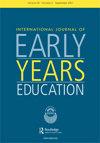Teachers’ conceptualisations of science teaching – obstacles and opportunities for pedagogical continuity across early childhood school forms
IF 1.3
Q2 EDUCATION & EDUCATIONAL RESEARCH
International Journal of Early Years Education
Pub Date : 2022-08-05
DOI:10.1080/09669760.2022.2107492
引用次数: 0
Abstract
ABSTRACT This study aims to contribute knowledge about obstacles and opportunities for pedagogical continuity in science across early childhood education. We use activity theory to analyse individual interviews and group meetings with teachers from preschool (age 1–5), preschool class (age 6) and grade 1–3 (age 7–9) in three Swedish school units. The teachers’ descriptions of their science teaching indicate both obstacles and opportunities for pedagogical continuity. For example, all teachers want to establish an interest in, and foster a caring attitude to nature, a similarity that facilitates continuity. However, some crucial differences indicate obstacles. There is a shift concerning ownership; from following children’s initiatives in preschool in bodily and play based experiences towards an emphasis on pre-planned content, verbal knowledge and written documentation in grade 1–3. Our findings also suggest that teachers lack knowledge about each other's teaching and curricula. Hence, the conditions for pedagogical continuity largely rest upon what children share in the science class. We argue that there is need for an in-depth exchange of experiences, regarding content, teaching methods and frame factors, between teachers from different school forms.教师对科学教学的概念化——幼儿学校形式教学连续性的障碍和机会
摘要:本研究旨在为幼儿教育中科学教学连续性的障碍和机会提供知识。我们使用活动理论来分析来自三个瑞典学校单元的学前班(1-5岁)、学前班(6岁)和1-3年级(7-9岁)教师的个人访谈和小组会议。教师对其科学教学的描述表明了教学连续性的障碍和机遇。例如,所有教师都希望建立对自然的兴趣,并培养对自然的关怀态度,这种相似性有助于连续性。然而,一些关键的差异表明存在障碍。所有权发生了变化;从学前班的身体和游戏体验到1-3年级强调预先计划的内容、口头知识和书面文件。我们的研究结果还表明,教师对彼此的教学和课程缺乏了解。因此,教学连续性的条件在很大程度上取决于孩子们在科学课上分享了什么。我们认为有必要在不同学校形式的教师之间就内容、教学方法和框架因素进行深入的经验交流。
本文章由计算机程序翻译,如有差异,请以英文原文为准。
求助全文
约1分钟内获得全文
求助全文
来源期刊

International Journal of Early Years Education
EDUCATION & EDUCATIONAL RESEARCH-
CiteScore
2.30
自引率
5.30%
发文量
50
 求助内容:
求助内容: 应助结果提醒方式:
应助结果提醒方式:


